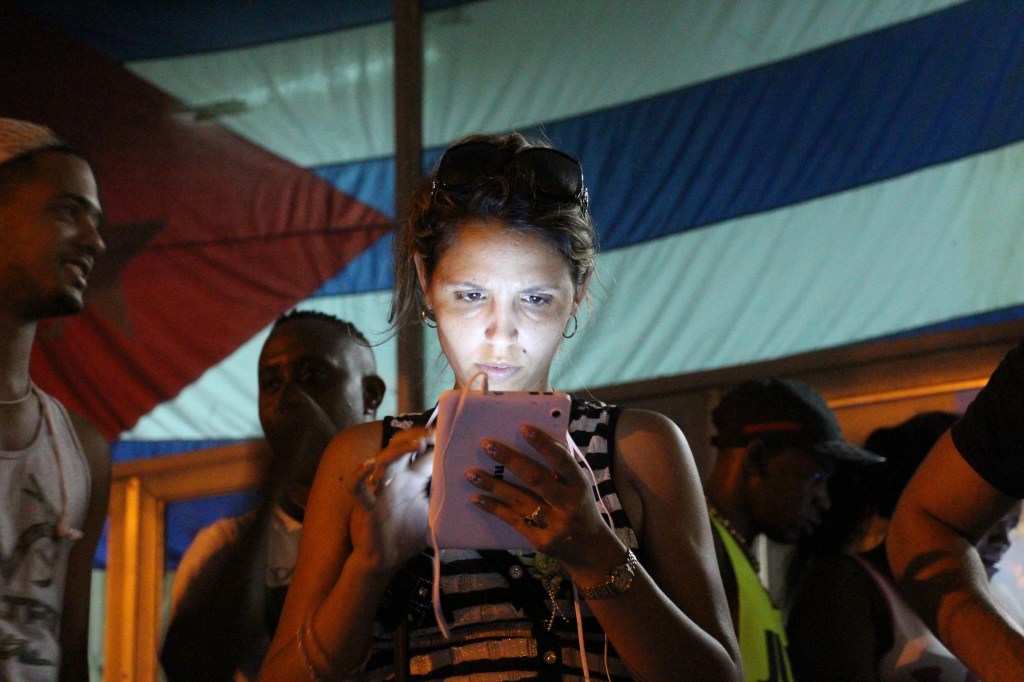The Cuban government is gearing up to produce what almost every Cuban wants—unless it’s made in Cuba. A new smartphone.
The project is part of Cuba’s attempt to catch up to the tech revolution — although on its singular terms. In theory, a home-grown smartphone could give internet access to the millions who cannot afford imported mobiles.
Videos by VICE
But the question is whether Cubans will want it. For a start, the plan to eventually create an original operating system means that users must relinquish all foreign apps because they won’t be compatible.
“The talent is definitely there to make a kick-ass cellphone,” said Michaelanne Thomas, who researches the Cuban Internet at the University of Michigan. “I think people will be willing to try it out, but news is going to travel fast if it sucks.”
The phone could also give the government another form of backdoor surveillance. “They’re going to have their own device, endemic to the island,” Thomas said. “I’m sure that in that same vein, it has got to give them more control.”
Still, because Cubans already expect that they are being watched online, concerns that a government-made smartphone is a tool to spy on them may not weigh as heavily as one might expect, she said.
The project, which has been in the works since at least 2015, was made public last month via a tweet featuring a sleek sky-blue prototype that looks strikingly similar to an Android phone.
The first 6,000 prototypes are already being assembled, according to the state electronics company, Gedeme, but the anticipated release date is unclear.
According to Thomas and others tracking the project, the first trials stumbled, with the prototypes sporadically sputtering into failure. If the phone proves to be faulty, Thomas believes that may be because some of the most innovative minds in technology prefer to work outside the government.
Cuba received the raw materials for the prototypes through an ongoing partnership with the Chinese company Huawei to acquire hi-tech parts. Huawei previously helped Cuba build its firewall, which turns some foreign websites into conspicuous blank pages. Among the roughly 50 censored sites is Freedom House, a non-profit promoting Internet freedom; Freedom House gave Cuba a score of 22 out of 100 on the openness of its internet policy.
The expected price of the government phone will be less than half that of black-market phones smuggled in by mules who line their suitcases with Androids and cheaper still than the Samsung models for sale by the national telecommunications firm Etecsa. Those phones typically cost more than four months of the average government salary.
“I paid my dad half my salary for 11 months—I was lucky to have someone loan me the money,” said Angel, a government worker making less than $50 a month. He asked that his real name not be published. “I could not afford basic goods, for this phone that is not even the newest model.”
There were 6 million phones online in Cuba in 2019, out of a population of 11 million, and just over half of those had regular access to mobile data, according to a report by the Cuban Ministry of Communication.
Cuba has inched through its internet rollout, offering the public easier access over several years, with cumbersome barriers to entry. Wifi is expensive, at a dollar per hour, and only available in select public parks. 4G data is just as costly, and cell coverage swings in and out unpredictably. The new phone could end up appearing as a mere mirage of progress towards Internet freedom; millions would gain access to the Internet, but only occasionally when they can afford it.
The government also announced that it will erect 50 new cellphone towers to provide more stable coverage to the entire island.
While the cellphone project was conceived years ago, the timing of the announcement could be deliberate — a message that the government wants to speed up Cuba’s slow-motion adoption of digital technology.
Until now, the smartphone project has been kept under wraps. One expert who has been in contact with the developers said workers in the Ministry of Technology have been walking around Havana using the phones for months or even years without any public acknowledgement of the project.
“Cuba has a long history of creating their own technology,” said David Nemer, a professor of media studies at the University of Virginia who researches Cuba, told VICE World News. “This is a way of showing the world that the embargo doesn’t get in the way of their development,” he added, referring to the U.S. trade embargo against Cuba.
Nemer said that President Miguel Díaz-Canel may be leading the shift on Internet policy since Raúl Castro retired as first secretary of the Communist Party in April.
“For the first time, Cuba has a civilian leader,” he said. “I don’t by any means think that this will cause a revolution, but it could really help to open things up.”
The government’s digital push does not mean it plans to give up control over information. When the authorities raided dissident movement Movimiento San Isidro last year, the government turned off mobile Internet access in certain areas to stop news of the event from spreading.
Once the smartphone’s kinks are worked out, the phone must then defy one of capitalism’s biggest challenges: fashion. “I don’t think people are afraid of buying a phone sold by the government,” said Luis Demetrio Gómez Garcia, a Cuban technology professor who teaches at Universidad APEC in the Dominican Republic.
“What I think is people here really like imported products and nice brands.”
More
From VICE
-

Screenshot: Activision, Nintendo -

Witthaya Prasongsin/Getty Images -

Anadolu/Contributor/Getty Images -

Humanoid HMD 01 Alpha Bipedal (Credit: Humanoid)


